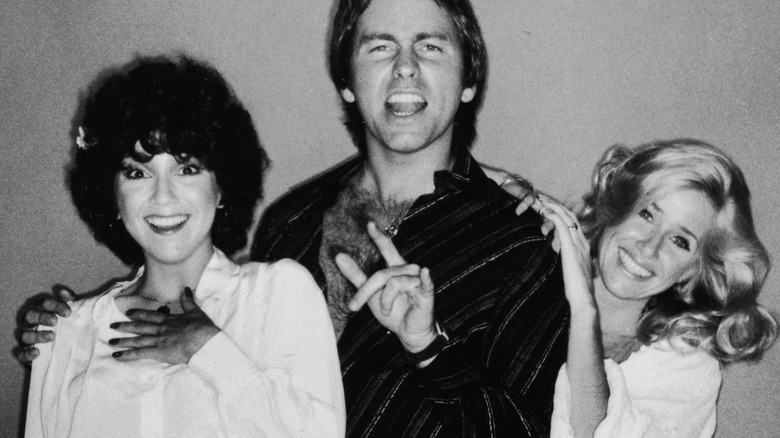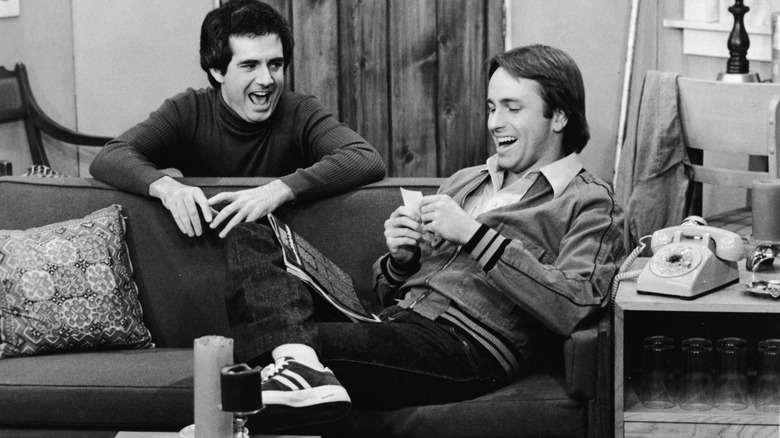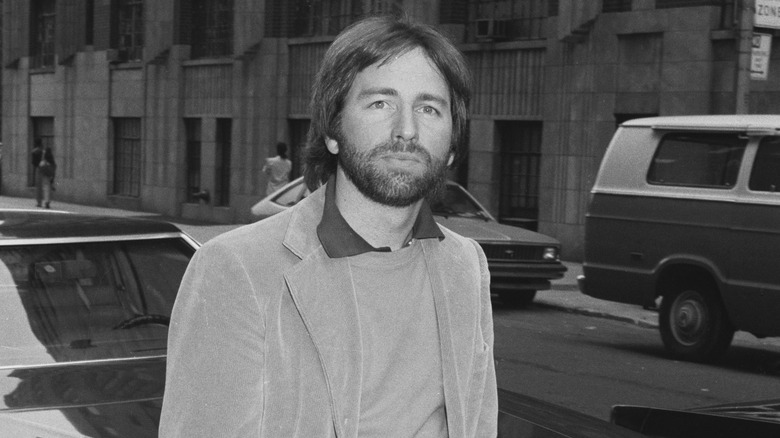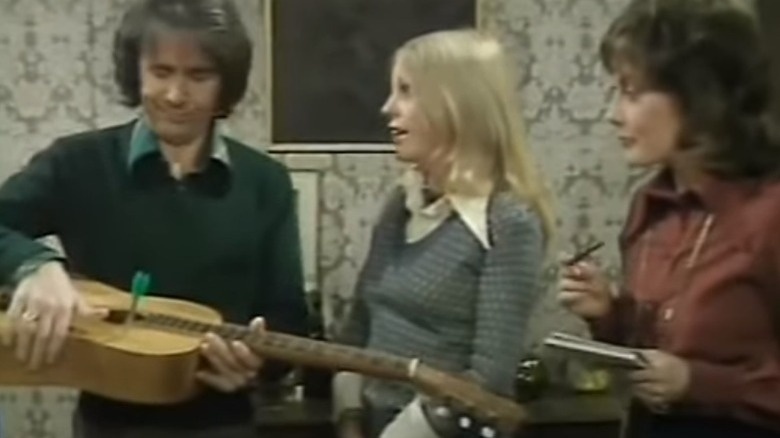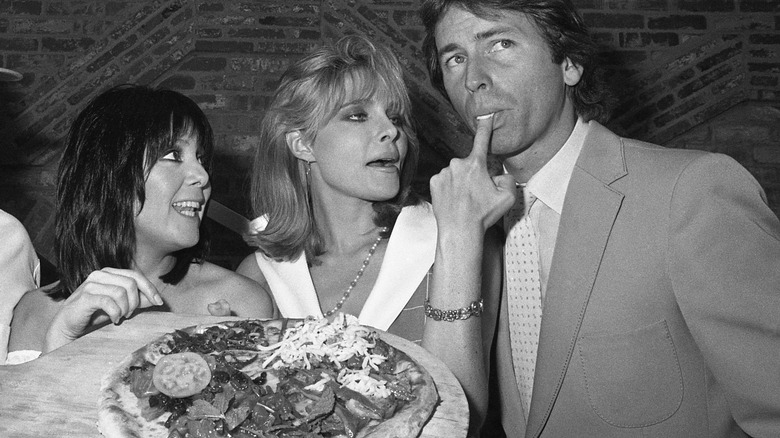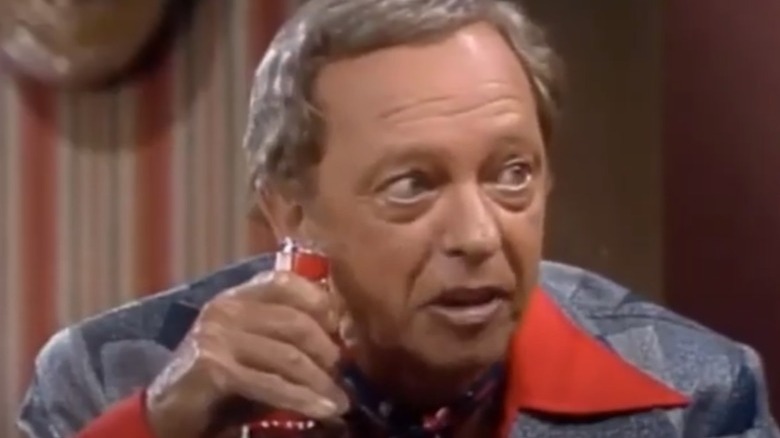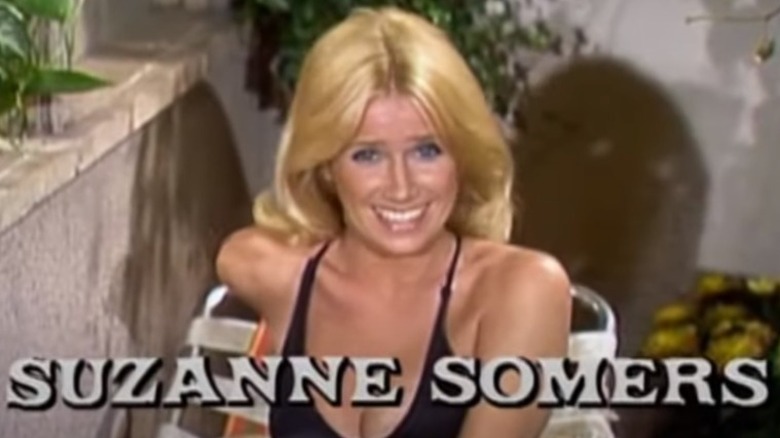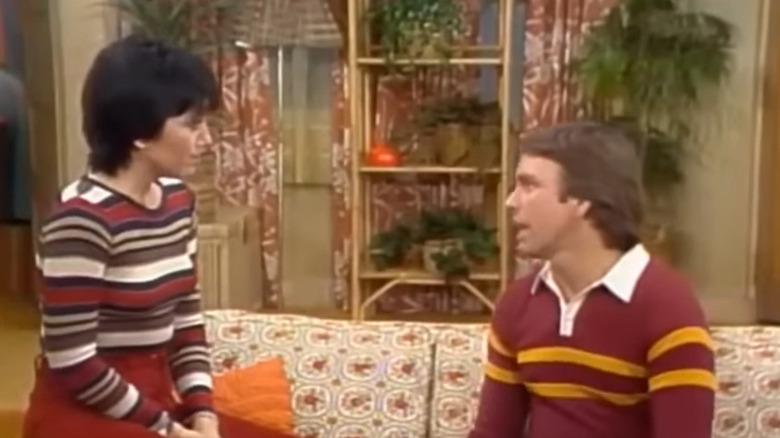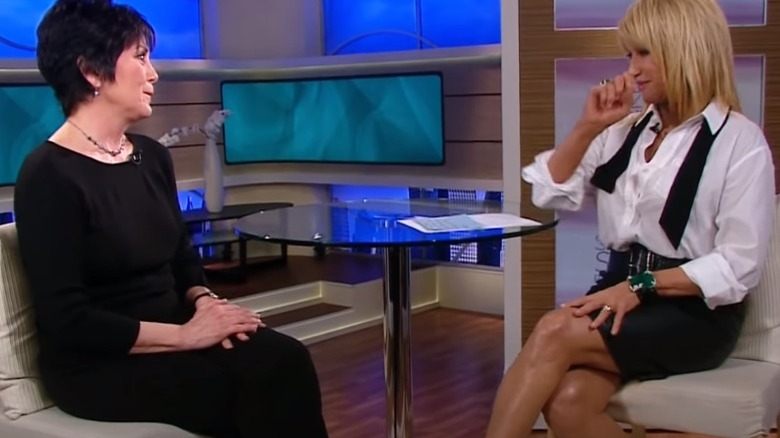Three's Company: A Look Back At The Hit Sitcom
While there's no denying that in today's entertainment landscape there's some singularly popular shows, comparing that to the popularity of programs in the 1970s and '80s is impossible. After all, there were only a very few options for people to watch after their nightly news gave way to primetime television. And at the time, the airways were dominated by some of the most cutting-edge content for an audience on the cusp of a real-life shift in things like feminism and LGBTQ+ visibility — and those shows included the wildly popular "Three's Company."
The premise was simple: Three people were sharing an apartment, but in order for the landlord to be all right with the set-up, the only man — played by John Ritter — had to pretend to be gay. Hilarity ensued, and America loved it.
Joyce DeWitt spoke with The Hamilton Spectator in 2021, and recalled just what made the show popular. Sure, it was funny, but it was the characters — and the friendship that bonded them — that kept people tuning in, and tune in, they did. "Most of America watched that show," she said. "The President of the United States actually moved a television address to a different night so he wouldn't annoy folks by being in our time slot. We were shocked at that." So, was there any juicy gossip, conflict, or secrets going on behind the scenes? Of course!
It was wildly controversial
To a modern audience, the concept of "Three's Company" might seem to be on the more harmless end of things. But to really appreciate the juggernaut that it was, it's worth looking at just how controversial it was. As The A.V. Club points out, "Three's Company" premiered in 1977 (and ran for eight seasons), at a time when the network's tendency to cast well-endowed actresses and dress them as provocatively as they could led to ABC's line-up being coined "jiggle TV." That said, "Three's Company" wasn't controversial for what might seem like the logical reason.
The show took full advantage of the opportunity to lean hard into the double entendres, the accidental misunderstandings, and the jokes about a sort of male-adolescent-giggle-giggle view of sex ... without directly coming out and saying any of that.
In his book "Come And Knock On Our Door: A Hers and Hers and His Guide to 'Three's Company,'" Chris Mann says that critics condemned the show not because it was sexy TV getting popular on primetime, but because it was seen as a step in the wrong direction. It came on the heels of shows like "All in the Family," "The Mary Tyler Moore Show," and "M*A*S*H," which CNN notes dealt with ground-breaking content in a huge way (bigotry and racism, women's rights, and the horrors of war, respectively). "Three's Company" was seen as being a huge step backward into light fluff and obvious jokes.
At the same time it was controversial, it was wildly progressive, too
At a glance, "Three's Company" might not seem like the most progressive show — slapstick comedy, teenage-level jokes, and women in tight clothes — but let's put things in context. As The Atlantic says, LGBTQ+ topics were still pretty rare. Then, "Three's Company" came out, and here's the thing: John Ritter's character was pretending to be gay — and that was absolutely fine for his landlords.
RadarOnline got a sneak peek at the documentary "Three's Company: The Unknown Story," and one of the things they talked about was what a massive deal it was. At a time when gay characters and issues just didn't make it onto television at all, "Three's Company" arguably helped normalize gay characters by making other characters perfectly accepting of a gay tenant. It was, after all, the prospect of pre-marital sex they didn't agree with.
Interestingly, it may be even more complicated than that. San Diego Gay & Lesbian News says that there's a case to be made that Ritter's Jack Tripper character was actually gay. Whether or not that's the case, Michael Montlack wrote a pretty powerful piece for Advocate. At the time, he was 7 years old and completely lacking in any gay icons to look up to until, he wrote, "Jack was there ... pretending to be something so foreign yet so natural to me, and informing me (no, us!) that we did in fact exist and could even find cozy homes for ourselves."
It was a remake of a British show
For anyone lamenting the lack of originality on TV today, here's a fun fact: "Three's Company" wasn't original at all. It was based on a British sitcom called "Man About The House," and according to The A.V. Club, it was more than just based on it — the premise and the pilot episodes were almost identical, right down to the credit sequence and dialogue.
In all fairness, the characters were a little different. America's Jack Tripper was a much more over-the-top sort than the British Robin Tripp, and while the American girls were very obviously meant to be sex symbols, the female leads in the British version were much more down-to-earth. Still, the British Comedy Guide says that when "Man About The House" premiered in the U.K., it was just as controversial as "Three's Company" would go on to be in the U.S. It was also just as successful, running for a respectable 39 episodes before ending with the natural progression of the break up of the three housemates.
There were U.K. spinoffs, too: Just like "The Ropers" was made using the "Three's Company" landlords, the landlords from "Man About The House" got their own show in "George & Mildred." While "George & Mildred" found a level of success that "The Ropers" didn't, it still came to an early end when lead actress Yootha Joyce passed away in 1980. And just like "Three's Company" was followed by "Three's a Crowd," "Man About The House" had a similar spinoff in "Robin's Nest."
The three stars handled the show's success very differently
Chris Mann, the author of "Come And Knock on Our Door: A Hers and Hers and His Guide to 'Three's Company,'" sat down with Closer Weekly for a retrospective on some of the things that were going on behind the scenes. That, Mann says, kicked off with conflict that started with the wildly different ways the three main stars handled the success of the show — and the fame that came with it.
John Ritter had a unique take on it, because he'd grown up in show business as the son of Western star Tex Ritter. He'd also been making appearances on all the big shows for a while before getting his own, and Mann says, "He was instilled with these sort of heartland values and took everything in stride."
Joyce DeWitt — who played the level-headed Janet — struggled with the popularity of the show. Originally setting out to be a stage actress, DeWitt hadn't counted on the shocking amount of publicity that she found herself facing, and being in the middle of it just confirmed her previous belief that while she wanted to act, she didn't want to be famous. Suzanne Somers was the polar opposite of that. Mann says that Somers — a slightly older single mom at the time — looked at her acting career as a business, and knew she wanted to do anything and everything she could to be successful.
So, let's talk about that reportedly and accidentally X-rated episode
In 2003, John Ritter appeared on "Late Night with Conan O'Brien" where he was asked about a particularly controversial Easter egg. According to the rumor, his character inadvertently showed a little more of himself than was intended, thanks to the short-shorts of the early 1980s. Nick at Night — which was running the episodes at the time — promised to edit the offending scene, and Ritter responded that he hoped they would continue to air both versions: "Because sometimes you feel like a nut, sometimes you don't."
Hilarious, sure, but is it true? Enter: Snopes. Snopes did some research into the incident, and found that although the episode had never been named by Nickelodeon, it was a 1983 episode called — hilariously — "The Charming Stranger." Nickelodeon confirmed that the episode had been edited, and "Three's Company" distribution firm FremantleMedia also confirmed that yes, they had the unedited version. Was there anything to be seen? Not really, and Snopes provided the screen captures to prove it. FremantleMedia wrote that "There is a nano-second where certain flesh is flashed, but not so much that you would really notice, unless you were looking out for it specifically."
Ultimately, Snopes ruled that this one is another one of TV's many urban legends.
Don Knotts was too good ... but Andy Griffith didn't think so
Don Knotts: The real national treasure. Perhaps most famous for playing Barney Fife in "The Andy Griffith Show," Knotts went on to "Three's Company" when they were in need of casting a replacement landlord — and according to insiders, he was equally loved and hated in the role.
When his daughter, Karen Knotts, spoke with Page Six, she recalled growing up seeing her father's transformation for the role of Mr. Furley. His performance endeared him to the show's gay fans, she said, and at the same time, it alienated those who had been introduced to him on "The Andy Griffith Show." "They thought it was too far away from the kind of values they grew up with," she explained. And they, apparently, weren't alone. Andy Griffith said in a series of interviews for the Television Academy, "I thought Don, for instance, was awful on 'Three's Company.' I told him when he came into 'Matlock,' I said, 'Don, bring it down, bring it down. You're on 'Three's Company' too long."
Knotts' fans will be happy to know that the "Three's Company" cast didn't share that opinion. When Joyce DeWitt spoke to Larry King after Knotts' death in 2006, she described him as "the most unassuming, graceful, gracious man you could ever know." He was also the reason for many, many reshoots, simply because he had his costars in hysterics.
John Ritter's son had a major yet unplanned cameo
In 2010, the HuffPost sat down with John Ritter's son, Jason. He was following in his father's footsteps to become the third generation of actor in the family, and stressed that in spite of being born into an acting family, it wasn't always a guarantee — even though his first on-screen appearance came when he was barely able to walk.
There are a few different versions of the opening credits of "Three's Company," set against the same song. In the version where the gang heads to the zoo for an afternoon, there's a scene of Janet feeding the goats at a petting zoo. A little boy toddles up to her, and that's a totally unscripted cameo by Jason Ritter. He explained: "I don't remember doing that. But the story is they were shooting a bunch of things at the zoo and I got away from my mom. I just walked into the shot and it made Joyce DeWitt laugh, so they kept it in the opening credits."
Jason was 23 years old when his father passed away, and went on to say that while he doesn't like it when people approach him to try to grieve with him, he does love hearing about the good memories his father left with legions of fans.
Suzanne Somers was fired for requesting equal pay
"Three's Company" kicked off in 1977, and although it did extraordinarily well, the writing was on the wall fairly early on — all because of a bid for equal pay.
According to Biography, Suzanne Somers initially signed a deal that gave her $3,500 per week. That was soon increased to a whopping $30,000 a week, and while that sounds like a ton of money, perspective is important. As 1980 rolled around, Somers was in a position to renegotiate her contract, and asked to be given a contract that would guarantee her pay was equal to what the men on the show — including John Ritter — were making. And what was that? That was a shocking $150,000 per week.
Somers asked for it, but the timing couldn't have been worse. The network had just paid out big time to keep "Laverne & Shirley" stars Cindy Williams and Penny Marshall, and according to Somers' husband, television producer Alan Hamel, her huge ask was seen as an opportunity to send a very clear message. He told People: "They decided they needed to make an example of female actresses so that no other woman would ask to be paid what men were making. ... It worked because for years, no woman asked to be paid what men were making, until Roseanne [Barr]." Somers blamed the gutsy move for being the end of her sitcom career.
Ritter, DeWitt, and Somers had a massive falling-out
Suzanne Somers asked for equal pay before the start of the fifth season, and it was a move that kicked off sort of a slow-burn downfall for the show. Somers, says The A.V. Club, hadn't just been asking for a raise for herself. The contracts of the three stars were tied together with a clause that would have necessitated an equally massive raise for Joyce DeWitt, and a smaller raise for John Ritter to keep him making more. That just wasn't going to happen, and in the fallout of that, the previously close cast spiraled into a series of conflicts.
Somers told "Entertainment Tonight" that her new contract would have kicked in during the sixth season, so that left the three to film season five with some serious tensions. Somers was left feeling like she was the scapegoat, while writers got more and more frustrated about having to work around a schedule where she may or may not have shown up to film on any given day.
With Somers' relationship with the cast and crew fractured, the writing was on the wall. Ritter soon started negotiating for a spin-off series (that would become "Three's a Crowd") and it was one that wouldn't involve Joyce DeWitt. She obviously found out about the spinoff that she hadn't been approached about, and she would later comment, "Treating people in insensitive, disrespectful ways in the name of moving forward is something Hollywood has a reputation for turning a blind eye to."
The truth behind the color-coded scripts
Here's one of those stories that sounds like a perfectly plausible yet still juicy bit of gossip, and that's the story that as Suzanne Somers was fulfilling the last requirements of her contract, tensions were so bad that the scripts for "Three's Company" were printed on different colored paper, depending on whether or not she was going to be in the episode. It was supposed to be an at-a-glance heads-up for her co-stars ... but is it true? Sort of.
CBR confirms that yes, there were scripts printed in different colors, but the reason wasn't advance notice for Ritter and DeWitt to let them know whether or not they would be working with Somers. At the time, no one working on the show was ever sure whether or not Somers would be available for any given episode, so two different scripts were always written. One included Somers, and one didn't — and they were printed in different colors so it was easy for everyone to tell which one they were going to use.
Amends were ultimately made
In 2020, Suzanne Somers described (to "Entertainment Tonight") how heartbreaking the falling out of the "Three's Company" cast had been, saying, "It was like being shunned from your family ... [The producers] painted me as greedy. ... So the whole show — cast and crew — shunned me. ... So, I never talked to anybody on that show ever again. Ever again."
It was a silence that lasted for years after Somers' 1981 departure from the show, but amends were eventually made. People says that in 1996, John Ritter got word that Somers was being treated for breast cancer. "[It] made me realize that all I care about is how happy and healthy she lives her life," Ritter said — so he called her. Somers recalled the conversation, saying, "He said, 'I miss you. I love you. I'm sorry,'" adding that she "said the same things."
Somers and DeWitt reunited on Somers' show, "Breaking Through," in 2012. TV Guide says that it was the first time they'd gotten together since the end of "Three's Company," and it was tear-jerking stuff. Apologies were said, and admissions were made: Somers admitted she had been overwhelmed and felt surrounded by serious actors, and was afraid that she wasn't worthy of being in the show. DeWitt spoke candidly about her fear of fame and discomfort with the others, and in the end, they hugged, found middle ground, and were grateful to reconnect.
John Ritter's death
John Ritter died suddenly in 2003, just days before his 55th birthday. According to the Los Angeles Times, he had been rehearsing for a scene in his show, "8 Simple Rules for Dating My Teenage Daughter" with guest star (and friend) Henry Winkler when he suddenly complained of symptoms he thought were food poisoning. He was taken to the hospital, where he passed away from what was later determined to be an undetected defect in the artery of his heart.
Former co-stars Suzanne Somers and Joyce DeWitt had nothing but good things to say about him. Somers recalled getting a phone call from him not long before his death, saying (via Fox News) that he had wanted her and DeWitt to do a cameo on "8 Simple Rules." Somers, however, suggested rebooting their relationship with a more serious project which would ultimately never happen. "So there was resolution, which feels good," she said. "We probably would've found a project, which would've worked. ... I'm glad I had that resolution with him. Really glad."
DeWitt spoke with Larry King after his passing, saying they had run into each other by chance when they stayed in the same New York City hotel. They got together, and headed out for a night on the town. She described him as "The best. ... You can't say anything else because he was just so ... very talented. ... He was so full of joy and love."
